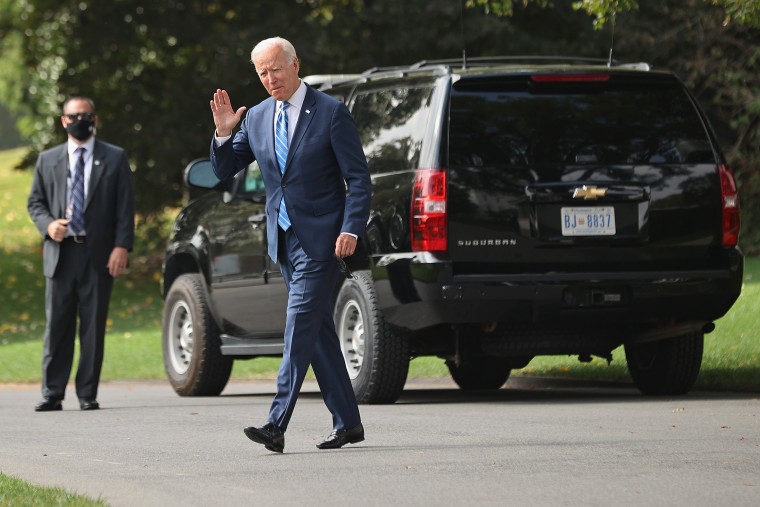WASHINGTON — Two big forces are shaping our politics ahead of next month’s elections in Virginia and next year’s midterms.
Force No. 1: President Biden has grown increasingly unpopular with the American public. This week’s national Quinnipiac poll has his overall job rating at just 38 percent among all adults with fewer than half of Americans (48 percent) approving of his handling of the coronavirus and just 42 percent believing the Biden administration is competent.
And if you don’t buy Quinnipiac’s numbers, there’s a recent NPR/PBS/Marist poll that has Biden’s approval slightly higher — at 45 percent.
Neither is good news for a first-year president, and both polls show him struggling with independents, who were central to his 2020 victory.
Force No. 2: Donald Trump’s hold over the Republican Party has only gotten stronger since the Jan. 6 attack on the Capitol.
The latest example of this: Sen. Chuck Grassley, R-Iowa, who criticized Trump’s words and actions on Jan. 6 (but who also didn’t vote to convict the former president in his second impeachment trial), will be appearing at Trump’s rally in Iowa tomorrow night.
Grassley, who’s running for re-election next year, also excused Trump’s Jan. 3 Oval Office meeting, where he tried — but failed — to get the Justice Department to carry out his demands to investigate allegations of voter fraud.
“The available evidence shows that President Trump did what we’d expect a president to do on an issue of this importance: he listened to his senior advisors and followed their advice and recommendations,” Grassley said Thursday.
What Grassley didn’t mention in his statement: On the agenda was Trump ousting the acting attorney general and installing a loyalist in his place.
So nearly a year after the 2020 presidential election, the two men who are shaping our politics are an increasingly unpopular Joe Biden versus a twice-impeached one-term Donald Trump.
Because midterm elections are typically referendums on the incumbent president, Force No. 1 probably remains the one to watch heading into next year.
But don’t discount Force No. 2, because what the GOP is offering voters is party that remains indivisible from Trump.
Tweet of the day
At least three of the 11 GOP senators won’t be back after next year
Per NBC’s Ed Demaria, three — and maybe four — of those 11 Republican senators who voted to proceed on that debt-limit increase will not be in the Senate after next year.
Barrasso
Blunt (retiring)
Capito
Collins
Cornyn
McConnell
Murkowski (getting a primary challenge)
Portman (retiring)
Rounds
Shelby (retiring)
Thune
Is Mo Brooks going to replace Shelby? Is Josh Mandel (or another Trump acolyte) going to win Portman’s seat? What about swapping Blunt for Eric Greitens?
That’s a vastly different U.S. Senate.
Data Download: The numbers you need to know today
$3 trillion: How big Rep. Pramila Jayapal wants the reconciliation bill to be, despite moderates calling for a far lower number.
3: The number of national monuments to which President Biden is expected to restore protections to, reversing Trump-era decisions.
4: At least how many are dead from flooding in Alabama.
44,212,753: The number of confirmed cases of the coronavirus in the United States, per the most recent data from NBC News and health officials. (That’s 117,994 more since yesterday morning.)
714,797: The number of deaths in the United States from the virus so far, per the most recent data from NBC News. (That’s 2,472 more since yesterday morning.)
399,552,444: The number of vaccine doses administered in the U.S., per the CDC. (That’s 877,030 more since yesterday morning.)
56.2 percent: The share of all Americans who are fully vaccinated, per the CDC.
67.6 percent: The share of all U.S. adults at least 18 years of age who are fully vaccinated, per CDC.
Virginia governor's race remains a tight contest
A new Wason Center poll shows Democrat Terry McAuliffe narrowly leading Republican Glenn Youngkin in Virginia’s gubernatorial contest, with McAuliffe getting support from 49 percent of likely voters and Youngkin getting 45 percent — well within the survey’s margin of error.
In August, the poll showed McAuliffe with a 9-point lead, 50 percent to 41 percent.
The poll also finds Democratic candidates narrowly leading the state’s races for lieutenant governor and attorney general.
The election in Virginia takes place on Nov. 2.
ICYMI: What else is happening in the world
Democrats are split over how to pare the Biden agenda as its $3.5 trillion price tag falls.
Trump and his allies are criticizing Senate Minority Leader Mitch McConnell over his deal with Democrats on the debt ceiling.
The Jan. 6 committee issued new subpoenas on Thursday, and former President Trump has asked his former aides to defy their earlier subpoenas.
Two journalists from the Philippines and Russia have won the Nobel Peace Prize for their "efforts to safeguard freedom of expression, which is a precondition for democracy and lasting peace."



